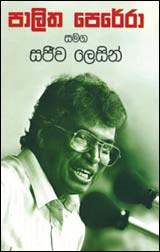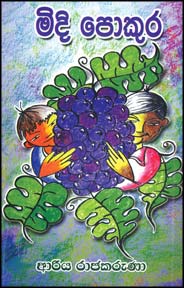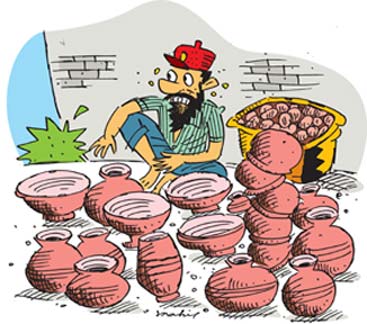|
[Writers' den]
Memoirs of a veteran broadcaster
Reviewed by Surekha GALAGODA
Palitha Perera Samaga Sajeewa Lesin written by veteran broadcaster,
cover page designer, song writer and above all, a loving human being
Palitha Perera was launched in the latter part of last year. The book is
also a commemoration and celebration of Perera's 45 years in
broadcasting.
 |
|
Palitha Perera’s Samaga
Sajeewa Lesin
Published by Fast Publishing (PVT) Ltd. |
The 391-page book printed by Fast Ads is adorned with a photograph of
this doyen broadcaster at a cricket match taken by the internationally
known photographer Sena Widanagama. The photograph taken unknown to him
is on the cover page designed by Prem Dissanayaka.
It is an autobiography, history book and everything else bundled into
one. Significantly it is a book where novices can learn techniques and
practical aspects of broadcasting and writing. You can read it
effortlessly as every page is a treasure-trove consisting of interesting
facts and information hitherto unknown to the public.
The award winning broadcaster Palitha Perera has rendered an immense
service to all Sri Lankans by penning his memories and it is my fervent
wish that this book should be translated into English so that people
around the globe who love him and his style of announcing will be able
to read about his experience first hand.
Thahanam Gase Gedi Ka Bandula Warnapura saha Pirisa is the story of
Bandula Warnapura and his team visiting South Africa and thereafter. In
the Conclusion he acknowledges that being unable to get the views of
Gamini Dissanayake makes it an incomplete story since journalists are
expected to present all shades of the story. This is a golden rule in
journalism and it proves that he is a veteran and we all have lessons to
learn from him.
Ukusu Asata yatin ringa dakunu Apricawata giya gamana is an interview
Palitha Perera conducted with Tony Opatha, the mastermind behind the
controversial South African tour.
Menna Pravuththi Bandula Warnapura Elidaraw karai is an interview
with Bandula Warnapura after the controversial tour.
Dosthara Piya Mawa Saha Daruwo is a chapter about the Controversial
Captain Bandula Warnapura, and his family and it includes a brief story
about Bandula Warnapura's birthday as recorded by his loving mother as
well as some instances of him getting hurt.
82 karalle viththikaruwo is a brief account of the members who played
in South Africa.
Warnapura Kathawa Gana Rahas Polisiya Palitha Pereragen Paya Dekak
Prashna Karai includes the episode of him being questioned at the CID
headquarters and how he met the late President J. R. Jayewardene and got
the opportunity to go to Bahamas Islands for a Commonwealth leaders
meeting with the President on a State visit.
Here he got an opportunity to meet Cuban President Fidel Castro at
the Revolution Palace in Cuba and the story is substantiated with a
photograph of Palitha Perera and President Fidel Castro.
Four chapters devoted to music maestro W.D. Amaradeva consists of
many stories which were earlier unknown.
Three chapters are dedicated to the song bird, the mesmerising voice
of veteran Nanda Malini where the reader can visualise this courageous
lady and the path she has travelled. There are many lessons a daughter
and a mother can learn from her life.
Palitha Perera has dedicated one chapter to trace the history of the
milestones in Sinhala language cricket announcing titled Guvan viduli
Sinhala cricket visthara prachara Ithihasaya Pilibanda Satahan Keepayak.
The chapter includes some rare photographs of BBC cricket commentator
Alan Heart, our own Premasara Epasinghe as well as Palitha Perera
playing cricket during their school days at Nalanda Vidyalaya.
He has dedicated one chapter to describe the Sri Lanka Team's visit
to England and how they beat the English team on their own soil. It is
replete with newspaper articles which appeared in English newspapers.
One of the most interesting stories is the interview with the late
Rukmani Devi 18 hours prior to her untimely death.
The book also carries interviews with veterans such as Ven.
Maduluwawe Sobitha Thera, late Prof. Nandadasa Kodagoda, actress Geetha
Kumarasinghe, A.J. Ranasinghe, late Gamini Fonseka, former President
Chandrika Bandaranaike Kumaratunga as well as an interview with
President Mahinda Rajapaksa when he was Prime Minister.
I consider it an honour to review a book written by well-known
cricket commentator Palitha Perera as it has been a treat to listen to
his golden voice.
I am extremely happy and humbly proud to know Palitha who is a
treasure trove and most of all a person who stands by his principles.
As mentioned in his foreword the idea of writing a book was mooted by
veteran broadcaster Daya De Alwis and though I did not have the good
fortune of meeting her I wish to thank her for inspiring Palitha Perera
to pen his thoughts and memories.
The rare collection of pictures in the book illustrates a separate
story. The book is dedicated to his loving wife, Leela, and his
children. May he have the strength to write many more books and may he
enjoy good health and companionship at all times.
In the 70's and 80's his deep husky voice attracted young and the old
alike and we used to be glued to the radio to listen to him and in the
course of my career I met him one day at a function.
I was reluctant to speak but when he spoke he put me at ease. He is
one of the best friends and his magnetic voice will make you forget half
of your problems.
The only drawback in this book is that the contents are not listed
but perhaps he did it on purpose as he wanted to change the style of
book writing.
Rich harvest from Japan!
by Ranga CHANDRARATHNE
Midi Pokura (The Bunch of Grapes) is an anthology of Japanese short
stories translated into Sinhala by Prof. Ariya Rajakaruna.
The book also includes criticisms on each short story which would
give the Sinhala reader an opportunity not only to appreciate the short
stories in the book but alsothe knowledge to appreciate short story in
general.
 |
|
Midi Pokura (The bunch
of grapes)
Ariya Rajakaruna
Published by
S.Godage and sons |
The anthology is made up of six short stories on diverse themes. The
title short story 'Midi Pokura' is woven around a school student who
robbed water colour sticks from a foreign student.
The school has a mixed racial student population with a foreign
teacher. The Japanese student, who is the narrator of the story, robs
colour sticks from a foreign student who is not so clever in painting.
"He is weak in painting compared with me. But when coloured with
water colours from his pad, his painting is indistinguishably bright. I
feel jealous whenever I think of it. I thought even I could draw
naturally if I had such colour sticks.
I was disappointed with cheap colour sticks I have. From that day on,
I was suffering from the craving for Jim's water colours."
In this manner the story is built convincingly and apart from the
reconciliation that the teacher brings about with her intervention,
short story manifests how a teacher should handle such delicate
situations especially in a multi-racial classroom. Instead of
reprimanding the student who robbed the water colours, teacher condones
his e offence, by offering a bunch of grapes. The story ends with the
powerful image of the teacher's hand with a bunch of grapes that is
offered to the student.
"Meanwhile the teacher who won our love, departed from us. I know I
will not meet her again. I still feel how nice it would be if she is
around. When the spring comes the bunch of grapes becomes dusty with
purple.
Even though nowhere could see her jade-coloured beautiful hand
carrying a bunch of grapes".
Among other things, the story Midi Pokura further confirmed the fact
that teacher should be an object lesson.
Bonikka (The Doll) is a story where a rich girl's doll is robbed by a
beggar girl.
The rich girl tells the teacher about the theft and the teacher
advises her to forget it. Here the story is also lased with a moral
message that fortunate should help less fortunate.
However, it should not be misconstrued as inducement for theft.
The rest of the stories such as Labukataya (The pumpkin), Balalekuge
Katandaraya (Story of a cat), Dodam (Orange), and Sekus Ashvaya (The
Circus Horse) are also stories laden with emotions.
Apart from offering a glimpse into the rich Japanese culture, book
can also be used particularly for youth as a guide book to short
stories. It is a must read for teachers, especially for teachers of
young students.
Feng-Shui, the key to success
Jeevithaya Jaya Ganeemata Ran dora Feng-Shui by Thilangani Herath was
launched in Colombo recently. Priced at Rs 480, the book is published by
Stamford Lake (Pvt) Ltd. Herath a well-known Feng-Shui master
practitioner and consultant who has learnt the science under the best
teachers who advises people to go either to a person who knows it or
abandon the idea totally and get about their own work rather than go to
a charlatan and get the wrong advice.
 |
|
Jeevithaya Jaya
Ganeemata
Ran dora Feng-Shui
Thilangani Herath
Published by Stamford Lake |
This is good advice as there are people who spend heavily but don't
get the desired results.
As outlined in the book she studied the age-old traditional science
of Feng -Shui just to find a solution to her own problems.
Therefore, she studied it in depth under the best known teachers for
several years prior to becoming a Feng-Shui master herself. The book is
divided into 14 chapters and each chapter explains how a person can get
the benefits of Feng-Shui or from the wind and water the basics of
Feng-Shui.
Each chapter is filled with practical tips and information and any
layman who has an interest in this science can get an understanding by
reading this book carefully.
The President's Secretary Lalith Weeratunga in his foreword to the
book has said that people living in a stressful world can learn many
things to lead a successful life. This is ample proof of the contents in
the book.
Thilangani Herath the master practitioner and consultant in
Feng(c)Shui studied under the world renowned Feng-Shui experts Lillian
Too and Joey Yap at the Lillian Too institute of Feng - Shui and Master
Academy of Chinese Metaphysics (c) Malaysia in addition to various other
Feng(c)Shui masters. Among the other books written by her are How to be
healthy, wealthy and happy in 2005, Jeewithaya Jayaganimata Feng-Shui,
2006 Jaya Ganeemata Feng Shui, Be Healthy, wealthy in 2007 and
Understand the Link between Feng-Shui and Ba-Zi.
SG
 Anawaratha
out on Jan. 21 Anawaratha
out on Jan. 21
The Sinhala narrative poem "Anawaratha" by Dr. Prabhath Jayasinghe,
who emerged as a poet in the nineties, will come out at the New Arts
Theatre (NAT), University of Colombo on January, 21 at 4.00 p.m. Dr.
Liyanage Amarakeerthi of University of Peradeniya will deliver the key
note address on "Aesthetic and textual functions of narrative poem: in
relation to Anawaratha, the Sinhala narrative poem".
The author's first book "Niyatha Vivarana", an anthology of poems,
was published in the early nineties.
Sunday Parable :
Clay pots
by Prof. Sunanda MAHENDRA
The elderly man who stood smilingly to all around him used to address
everybody as putha or literally meaning 'sonny'. "Where are you bound to
putha?" He would ask a young boy when he sees him coming to buy
something from the marketplace. Then he would help the person concerned
in the best possible manner. He had his own small stall where he kept
for sale fruits and vegetables. All those around him knew this elderly
person as a pious being who was helpful to others. If a person finds no
place to sell his commodities he would accommodate him in his own stall.
Thus he would share his place of work with others as well. "Hello how
are you, putha? Are you not going to school these days?" He would ask a
young boy who would come to buy fruits from him, "What do you want to
buy putha? Do you like these oranges putha?" He would sell them at the
lowest possible price, attracting many more customers.
"I have only five rupees, Mama." The boy would say. Then in kind
words he would respond. "It does not matter putha. You had better take
those oranges. I know your dad, putha, Give my regards to him putha."
The kind words of this man spread to all quarters of the marketplace, to
the extent that some called his stall 'Puthage Kade' meaning 'son's
stall'.
If someone is in trouble, some used to say that 'it is better to get
an advice from putha. The victim would go quickly to the kind man and
ask: "Can you help me?" "Yes putha, what can I do for you?" He would
ask.
 The
troubles would be in a few minutes solved. One day a mod looking young
man came by a noisy new car that looked like a four wheeled jet plane.
As the mod boy approached the seller, the latter asked, "Yes putha what
can I do for you?" A few minutes ago a pingo man with a whole heap of
clay pots came and asked for a favour. The
troubles would be in a few minutes solved. One day a mod looking young
man came by a noisy new car that looked like a four wheeled jet plane.
As the mod boy approached the seller, the latter asked, "Yes putha what
can I do for you?" A few minutes ago a pingo man with a whole heap of
clay pots came and asked for a favour.
"Can I sell my clay pots here?" The seller of pots asked. "Yes by all
means, you can make use of my stall. I am here to help you all." "I have
some more clay pots." "Bring them all and sell them here or wherever you
like." The clay pot seller thanked him. The mod young man who came by
the jet look car coincidentally wanted to buy quite a number of clay
pots.
"Thaththe (father) I want to buy some clay pots," said the young man.
At this manner of address denoted by 'thaththe' the man was amazed. "I
have never come across a young man address me as 'father'" Thought the
man. He was overjoyed, and wanted to raise a few questions.
"Putha, how many clay pots do you want to buy?" "As much as possible
I can carry them in the car boot." "Oh that's good putha, but clay pots
are fragile. You got to handle them carefully." "I think I can manage."
"But putha I will help you certainly." Saying so, he helped the young
man to carefully pack quite a number of clay items in the car boot. The
clay pot seller was so elated at the situation, and went on looking at
everything in bewilderment. "What else do you want to buy putha," the
good old man asked the young man.
"No thaththe, that's enough. Let me settle the bill now." "Good putha,
that's good. It's Rs. 1,000." Then the young man rushed to the car.
Opened the door and got in hurriedly.
He switched on the engine as the good old man was looking on. "Good
bye Thaththe," said the young man who drove the car as fast as possible,
and disappeared. The clay pot seller asked "Did you get my money."
"1,000 you mean?" "Yes money from your putha?" "No he cannot be my
putha. He is a rascal of the first order. He deceived me." "So what are
you going to do for the money?" "Don't worry, I will pay you out of my
pocket. We are poor people who can be deceived by various culprits of
that kind." |

